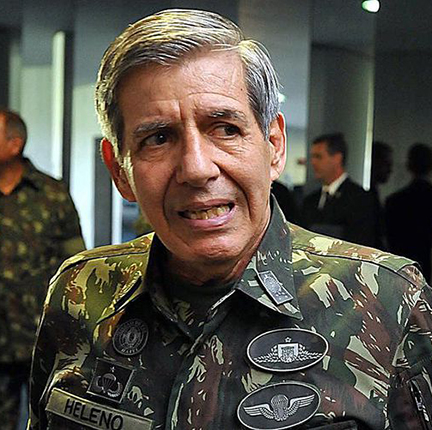BRASILIA, (Reuters) – Venezuela’s armed forces will either depose President Nicolas Maduro and lead a transition to democratic rule or face divisions that risk a civil war, the Brazilian government’s top security adviser said yesterday.
Retired General Augusto Heleno, national security adviser to President Jair Bolsonaro, told Reuters the situation in Venezuela was unpredictable after opposition leader Juan Guaido unsuccessfully called on the military to change sides last month.
Only a handful of soldiers headed Guaido’s call to back the opposition on April 30 and since then Maduro’s government has launched a crackdown on opposition legislators allegedly linked to the attempt.
Despite U.S. sanctions, the upper echelons of Venezuela’s military have largely ignored entreaties from the opposition and Washington to turn against Maduro and just over 1,000 troops have defected, mostly to Colombia and Brazil.
“The future of Venezuela will be decided by the armed forces: either they stay in power with the same government or they remove Maduro,” Heleno said in an interview. “We don’t know how the military will act. Either they will oust Maduro, take power and set in motion a return to democracy, or they could split between Guaido and Maduro, which is the riskier scenario that could set off a civil war,” he said.
Venezuela’s information ministry – which handles media enquiries for the government – did not immediately respond to a request for comment on Heleno’s remarks.
Bolsonaro’s right-wing government has joined more than 50 other nations in recognizing Guaido as the legitimate leader of Venezuela and backed an opposition initiative to deliver U.S. humanitarian aid to the neighboring country in February.
Maduro shut the border with Brazil to block the aid, but reopened it on Friday, allowing a flow of Venezuelans crossing in search of food, medicine or an escape from the economic and political turmoil in their homeland.
Bolsonaro, a former army captain, has echoed U.S. President Donald Trump’s hard-line view on the need for change in Venezuela, including the possible use of troops.
However, Brazil’s military as well as Vice President Hamilton Mourao – a former general – have ruled out any intervention in Venezuela.
Not even the U.S. government knows which way things will turn out in Venezuela but the United States is trying to avoid a military invasion, according to Heleno.
“They just don’t want Venezuela becoming another Cuba. It’s a nightmare for them,” he said.
“The Americans are trying to deal with the situation peacefully, diplomatically, without taking military action, even though they have the potential to do so,” he said. U.S. Secretary of State Mike Pompeo said earlier this month in a television interview that the United States was prepared to take military action to stem the ongoing turmoil in Venezuela, but added that Washington would prefer a peaceful transition of power.
Maduro says that the U.S. government, supported by regional allies in Latin America, wants to forcibly oust him from office in order to exploit Venezuela’s oil wealth.






